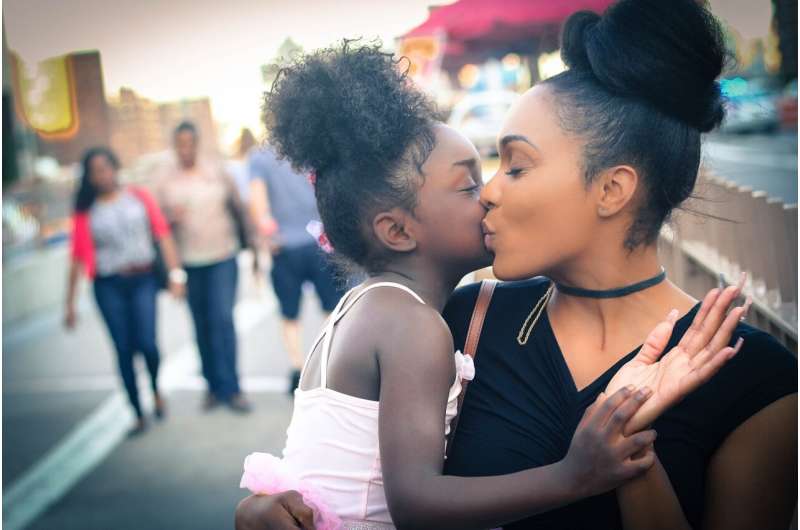Credit: Pixabay/CC0 Public Domain
In September 2020, Dr. Chaniece Wallace was a healthy 30-year-old physician, seven months pregnant. A photo from her baby shower shows her beaming, surrounded by pink and purple balloons, standing next to a 5-foot tall tower of blocks that spelled "BABY."
A month later, at her routine OB-GYN appointment, her blood pressure measured high enough to send her to the hospital. Wallace was admitted, and started having sharp stomach pains. She was drenched in sweat.
Clinicians at first said it must be a panic attack, her husband said. But when her blood pressure continued to climb and the pain in her belly wouldn't stop, they finally put it together: Wallace's liver had ruptured, a sign she was suffering from preeclampsia, a harbinger of a life-threatening pregnancy complication.
Her baby girl was safely delivered by emergency C-section. Over the next couple days, however, Wallace's condition deteriorated. Her kidneys began to fail. She'd developed eclampsia, and had a seizure. Overnight, she had a brain hemorrhage and died.
A chief pediatric resident at a children's hospital in Indianapolis, Wallace knew well the increased risk pregnancy poses for women of color.
Black women like her are three times more likely to die of causes related to childbirth than white women. Experts say the racial disparity stems from a confluence of factors including systemic racism and inequity, bias in medicine and a lack of health resources.
"She was an advocate for women that were experiencing this. And for it to be in our house, in our lives—it was not only shocking. It was gut-wrenching," said Anthony Wallace, who would have celebrated their seventh anniversary this month. "With the knowledge we have about preeclampsia and eclampsia now, Chaniece should still be here."
As the nation recognizes Black Maternal Health Week this week, experts want to keep the stories of women and birthing people at the forefront. They want them to feel supported, their child bearing experiences celebrated and protected, and systems to be improved and held accountable.
The first year of the pandemic saw a surge of maternal deaths, particularly among women of color, according to the Centers for Disease Control and Prevention, with the mortality rate of Black moms in 2020 increasing from 44 deaths to 55 deaths per 100,000.
As part of its Build Back Better package, the Biden administration introduced legislation in Congress last year aimed at improving Black maternal health. Advocates praise the effort but say action has been too long in coming.
"Black birthing individuals are deserving of all of the best that we have to offer. And they're not getting that from us right now," said Dr. Allison Bryant, an OB-GYN and senior medical director for health equity at Mass General Brigham health system. "We have to do better."
Renewed commitments to shape policy to improve maternal health comes follows the glaring inequities seen in COVID-19 deaths. But experts say the social foundation of these public health disparities have been known for decades.
"We've been screaming from the mountaintops for years," said Dr. Veronica Gillispie-Bell, an OB-GYN at Ochsner Kenner Health and medical director of the Louisiana Perinatal Quality Collaborative. "There's sadness, because it feels to some degree, like Black women have been thrown away."
Monica McLemore, a nursing professor at University of California, San Francisco, said solving the systemic problem requires a holistic approach.
"We've described the problem relatively well. We know that it exists in terms of who's dying and why. But we have not funded the interventions or the strategies that would allow us to see improved outcomes," she said.
Tufts University Schools of Medicine public health professor Ndidiamaka Amutah-Onukagha, assistant dean for diversity and inclusion, researches reproductive health of people of color. She noted the increase in 2020 could have been due to more accurate reporting on death certificates, but the disparity is still exists.
"It's just an understatement to say that the health care system continues to fail Black and brown birth," she said. "It's getting more visibility, more messaging. It's on the policy agenda."
Amutah-Onukagha called the nation's health care infrastructure "broken," with people of color taking the brunt.
"It's always been we're peeling back the layers around racism, discrimination, these microaggressions, these acute instances that happened in labor and delivery," she said, "But now, we're putting it under a microscope."
Wallace's death was particularly striking to her.
"Her preeclampsia was so untreated that her organs and brain swelled," she said. "I shed tears for the opportunities that were cut short."
Anthony Wallace has worked hard to make sure his daughter Charlotte doesn't forget her mom. He points to pictures of her around the house, and says her name often—so often that on a recent evening when he said "Chaniece" on the phone, Charlotte cooed, "mama."
"Yes, mama," he said to the little girl in his arms.
Eighteen months after Chaniece's death, Wallace still keeps her cell phone and black clutch tucked in his car. The loss of his charming, bright-eyed wife, the one he'd call in the middle of a rough day just so they could pray together, is "unexplainable," he said.
His wife talked frequently, he said, about how health professionals need to do a better job listening to women of color about how they feel in their bodies. He wants to "continue to be a voice" for her and other women, Wallace said.
"I think she was heard," he said of his wife. "But I don't think she was listened to."
(c)2022 USA Today
Distributed by Tribune Content Agency, LLC.






















